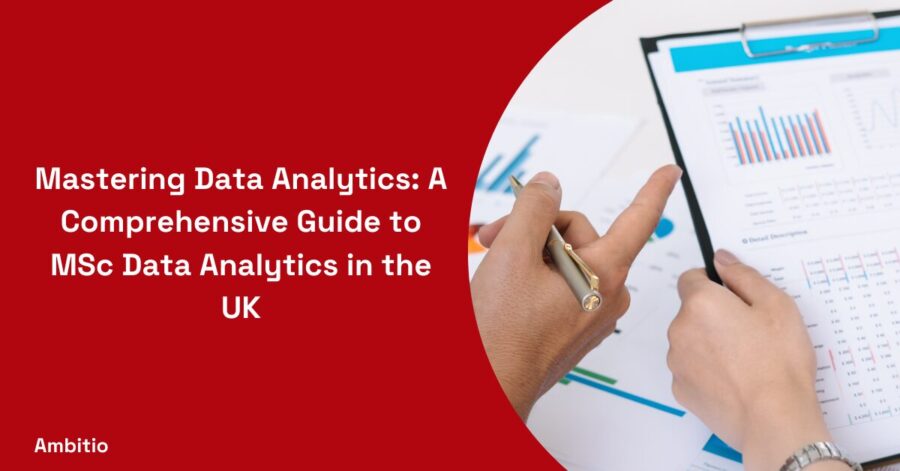12 December 2024
6 minutes read
Mastering Data Analytics: A Comprehensive Guide to MSc Data Analytics in the UK

In the era of big data, the field of data analytics has become pivotal in extracting meaningful insights from vast amounts of information. The UK, with its rich academic heritage, has emerged as a leading destination for pursuing a Master of Science (MSc) in Data Analytics.
This blog aims to explore the intricacies of MSc Data Analytics programs offered by UK universities, highlighting key universities, courses, entry requirements, and the promising career paths that follow.
The Rising Significance of Data Analytics in the Modern World
Data Analytics has transcended beyond being just a buzzword; it is now an integral part of decision-making in business, healthcare, finance, and more.
The UK, recognizing this trend, has positioned its academic programs to produce graduates who are not only proficient in data analysis but also adept at applying this knowledge in real-world scenarios.
Understanding the MSc Data Analytics Curriculum
What to Expect in Your Studies
Enrolling in an MSc Data Analytics program in the UK, you will embark on a journey through various facets of data analytics. The curriculum generally spans over one to two years, depending on whether you opt for full-time or part-time study.
Core Modules and Electives
Typical core modules include:
- Foundations of Data Analytics: Here, you learn the basics of data analysis, including statistical methods and data handling techniques.
- Big Data and Machine Learning: This module dives into advanced topics like machine learning algorithms and handling large datasets.
- Data Visualization and Interpretation: Essential for presenting data findings, this module teaches you how to visually communicate data insights effectively.
Electives often vary but can include specialized subjects like cybersecurity, healthcare analytics, and financial data analysis.
Practical Projects and Research
Many programs incorporate capstone projects or dissertations, providing an opportunity to apply learned skills to real-world problems or novel research topics.
The Role of Accreditation and University Reputation
Choosing an Accredited Program
Accreditation ensures that the program meets certain educational standards. Opting for an accredited course can enhance your degree’s recognition among employers.
The Impact of University Reputation
Attending a university with a strong reputation in data analytics can offer added advantages, such as quality faculty, extensive resources, and networking opportunities.
Entry Requirements and Application Process
When considering an MSc in Data Analytics in the UK, understanding the entry requirements and application process is crucial. Here’s a breakdown of what you typically need to prepare for:
- Academic Qualifications:
- A bachelor’s degree: Most universities require an undergraduate degree, preferably related to data analytics, such as computer science, mathematics, or statistics.
- Minimum Grade Requirements: Some institutions specify a minimum grade, often an upper second-class honors degree (2:1) or equivalent.
- English Language Proficiency:
- Non-native English speakers usually need to provide evidence of their English language proficiency, typically through IELTS or TOEFL scores.
- Minimum Score Requirements: The required score varies, but usually, an IELTS score of 6.5 or above, with no component lower than 6.0, is expected.
- Work Experience (Optional but Beneficial):
- Some programs may prefer or require relevant work experience, especially for more competitive courses.
- Some programs may prefer or require relevant work experience, especially for more competitive courses.
- Letters of Recommendation:
- Usually, two references are required, which can be academic or professional, demonstrating your suitability for the program.
- Usually, two references are required, which can be academic or professional, demonstrating your suitability for the program.
- Personal Statement:
- A well-crafted personal statement explaining your interest in data analytics, your career goals, and why you are a good fit for the program.
- A well-crafted personal statement explaining your interest in data analytics, your career goals, and why you are a good fit for the program.
- Curriculum Vitae (CV):
- A current CV outlining your academic background, work experience, skills, and any relevant projects or achievements.
- A current CV outlining your academic background, work experience, skills, and any relevant projects or achievements.
- Application Form:
- Completion of the university’s official application form, available on their website or through centralized application systems like UCAS Postgraduate.
- Completion of the university’s official application form, available on their website or through centralized application systems like UCAS Postgraduate.
- Application Fee:
- Some universities charge a non-refundable application fee.
- Some universities charge a non-refundable application fee.
- Interviews (in some cases):
- Some programs may require an interview, either in person or online, as part of the selection process.
- Some programs may require an interview, either in person or online, as part of the selection process.
- Deadlines:
- Be aware of application deadlines, which can vary by university and sometimes differ for international students.
- Be aware of application deadlines, which can vary by university and sometimes differ for international students.
- Visa Requirements (for International Students):
- International students should also consider visa application processes, including proving financial stability and health insurance coverage.
- International students should also consider visa application processes, including proving financial stability and health insurance coverage.
- Scholarship Applications (if applicable):
- If you’re applying for scholarships, note additional requirements and deadlines for these applications.
- If you’re applying for scholarships, note additional requirements and deadlines for these applications.
Remember, specific requirements can vary between universities and programs, so it’s essential to check the exact criteria for the courses you are interested in.
Exploring Financial Aspects and Scholarships
Understanding the financial aspects and scholarship opportunities is a crucial part of planning for an MSc in Data Analytics in the UK. Here are the key points to consider:
- Tuition Fees:
- The cost of tuition varies widely between universities and can range from £10,000 to over £20,000 per year for international students.
- For domestic students, fees are generally lower, often ranging from £7,000 to £10,000 per year.
- Living Expenses:
- In addition to tuition, students should budget for living expenses, including accommodation, food, transportation, and personal expenses.
- The cost of living can vary depending on the location, with cities like London being more expensive. Monthly living expenses can range from £1,000 to £1,500.
- Scholarships and Bursaries:
- Many universities offer scholarships based on academic merit, financial need, or specific criteria such as the student’s country of origin.
- Bursaries and grants may also be available and are typically need-based.
- External Scholarships:
- Various organizations, foundations, and governments offer scholarships for international students to study in the UK.
- These scholarships often have separate application processes and eligibility criteria.
- Research Assistantships and Teaching Positions:
- Some universities offer positions as research assistants or teaching assistants, which can provide a stipend or a waiver of tuition fees.
- Some universities offer positions as research assistants or teaching assistants, which can provide a stipend or a waiver of tuition fees.
- Student Loans:
- Domestic students may have access to student loans through government schemes.
- International students should explore loan options available in their home country.
- Part-Time Work:
- Students can work part-time to supplement their income. The UK typically allows international students to work up to 20 hours per week during term time.
- Students can work part-time to supplement their income. The UK typically allows international students to work up to 20 hours per week during term time.
- Budgeting and Financial Planning:
- It’s essential to plan your budget carefully, taking into account all potential expenses and income sources.
- Many universities offer financial advice and budgeting support to students.
- Cost of Course Materials:
- Remember to include the cost of textbooks, software, and other course materials in your budget.
- Remember to include the cost of textbooks, software, and other course materials in your budget.
- Health Insurance:
- International students may need to factor in the cost of health insurance, although they often have access to the National Health Service (NHS).
- International students may need to factor in the cost of health insurance, although they often have access to the National Health Service (NHS).
- Emergency Funds:
- It’s advisable to have some emergency funds set aside for unexpected expenses.
- It’s advisable to have some emergency funds set aside for unexpected expenses.
- Currency Exchange and Transfer Costs:
- International students should also consider the cost of currency exchange and transferring money to the UK.
- International students should also consider the cost of currency exchange and transferring money to the UK.
Remember, financial planning for your studies is as important as academic preparation. It’s advisable to start researching and applying for scholarships early, as they can be competitive and have specific deadlines.
Career Opportunities and Industry Connections
After completing an MSc in Data Analytics in the UK, graduates have a wide array of career opportunities and can benefit significantly from the industry connections they’ve formed during their studies.
Here are key points outlining the potential career paths and the importance of industry connections:
- Diverse Career Roles:
- Graduates can pursue various roles, including Data Analyst, Data Scientist, Business Intelligence Analyst, Data Engineer, and Statistical Analyst.
- Opportunities also exist in niche areas like Healthcare Analytics, Financial Data Analysis, and Marketing Analytics.
- Industry Demand:
- There is a high demand for data analytics professionals across various sectors, including finance, healthcare, technology, retail, government, and consulting.
- Data analytics skills are also valued in emerging fields like artificial intelligence and machine learning.
- Competitive Salaries:
- Careers in data analytics are often associated with competitive salaries, reflecting the high demand and specialized skill set required in this field.
- Careers in data analytics are often associated with competitive salaries, reflecting the high demand and specialized skill set required in this field.
- Internship and Placement Opportunities:
- Many universities offer internship programs or industry placements as part of the MSc course, providing practical experience and networking opportunities.
- Many universities offer internship programs or industry placements as part of the MSc course, providing practical experience and networking opportunities.
- Alumni Networks:
- Universities typically have extensive alumni networks, which can be a valuable resource for job searching and career advice.
- Universities typically have extensive alumni networks, which can be a valuable resource for job searching and career advice.
- Industry Partnerships:
- Collaboration between universities and industry partners can offer insights into current industry practices and future trends.
- Collaboration between universities and industry partners can offer insights into current industry practices and future trends.
- Career Services and Support:
- University career services offer support in CV writing, interview preparation, and job search strategies, often tailored to international students as well.
- University career services offer support in CV writing, interview preparation, and job search strategies, often tailored to international students as well.
- Industry Events and Workshops:
- Participating in workshops, seminars, and industry events can provide additional learning opportunities and networking platforms.
- Participating in workshops, seminars, and industry events can provide additional learning opportunities and networking platforms.
- Global Career Prospects:
- The skills acquired from a UK MSc in Data Analytics are globally recognized, opening up career opportunities worldwide.
- The skills acquired from a UK MSc in Data Analytics are globally recognized, opening up career opportunities worldwide.
- Entrepreneurial Opportunities:
- Graduates with entrepreneurial aspirations can leverage their data analytics expertise to start their own ventures or consultancies.
- Graduates with entrepreneurial aspirations can leverage their data analytics expertise to start their own ventures or consultancies.
- Continued Professional Development:
- The field of data analytics is continuously evolving, offering opportunities for ongoing learning and specialization in areas like big data, cloud computing, and predictive analytics.
- The field of data analytics is continuously evolving, offering opportunities for ongoing learning and specialization in areas like big data, cloud computing, and predictive analytics.
- Post-Study Work Visa Options:
- In the UK, the Graduate Route visa allows international students to stay for up to two years after graduation to work or look for work.
- In the UK, the Graduate Route visa allows international students to stay for up to two years after graduation to work or look for work.
- Networking Events at Universities:
- Universities often host networking events, allowing students to meet industry professionals and potential employers.
- Universities often host networking events, allowing students to meet industry professionals and potential employers.
By leveraging the skills, experiences, and connections gained during their MSc program, graduates are well-equipped to enter and excel in the dynamic and rapidly evolving field of data analytics.
The International Student Experience in the UK
Cultural Diversity and Support Services
The UK is known for its multicultural environment, offering a welcoming atmosphere for international students. Universities typically provide extensive support services including orientation programs, language support, and career counseling.
Work Opportunities During and After Studies
Students often have the option to work part-time during their studies. Post-graduation, there are opportunities to stay in the UK under work visas, such as the Graduate Route, to gain practical experience in the field of data analytics.
Conclusion
Embarking on an MSc in Data Analytics in the UK is not just about gaining a degree; it’s about immersing yourself in a rich educational experience that prepares you for a dynamic and fulfilling career.
With its blend of rigorous academics, practical experience, and a supportive environment, the UK stands out as a premier destination for aspiring data analysts from around the world.
FAQs
What are the entry requirements for an MSc in Data Analytics in the UK?
Most universities require a good honors degree, IELTS scores for non-native speakers, and a background in a related field.
Which UK universities offer the best Data Analytics MSc programs?
Top choices include the University of Strathclyde, London Metropolitan University, Birmingham City University, and the University of Liverpool.
What career opportunities are available after completing this MSc?
Graduates can pursue roles as data analysts, data scientists, and in areas like machine learning and financial data analysis.
Does the course include practical training?
Yes, most programs include modules that provide practical skills in data analytics, including real-world project work.
Are there options for international students in these programs?
Absolutely, UK universities welcome international students, with specific entry requirements like English language proficiency.

You can study at top universities worldwide!
Get expert tips and tricks to get into top universities with a free expert session.
Book Your Free 30-Minute Session Now! Book a call now




























